Script Analysis Series by WunTu Media
Analysist requested by a third party company.

The strong mixture of traditional African culture with advanced technology, with the outstanding visual effects and action scenes, all brought to life by an incredible cast and director. Black Panther by all counts, made cinematic history, as the current top third grossing movie of all time, and as the first ever super hero movie to be nominated for an Oscar for Best Picture.
However, among all of the winning strategies comprising the film, the story, written by Ryan Coogler and Joe Robert Cole, is the root of its success. As part of our new script analysis series, we take a moment to for a deeper look into the story, and at how ten defining moments created a movie that will impact generations for years to come.
1. Onset Conflicting Theme: Protection vs. Empowerment

The conflicting views of King T’Chaka and his brother N’Jobu sets up the impending eruption of normalcy, which weaves its way throughout the film. T’Chaka, believing in protecting Wakanda, even if that means abandoning people, will do whatever he can to keep Wakanda’s true power secret. On the other hand, his younger brother N’Jobu, has been on a “War Dog” assignment, living outside of the protective Wakandan border in the tough neighborhood of Oakland, California. He sees Wakanda’s advanced technology as an opportunity to help African descendants all over the world, to rise up against their oppressors and as their path to prosperity.
Both men are right in their ambitions. T’Chaka, is following the lead of his ancestors for generations, and the other, N’Jobu, is sympathizing with the realities of the outside world. These strong beliefs only transcend down to their sons – T’Challa, son of T’Chaka, and heir to the throne, and N’Jobu’s abandoned son, Killmonger, as the American CIA call him for being an expert killer
2. Strong Women Leading Instead of Following
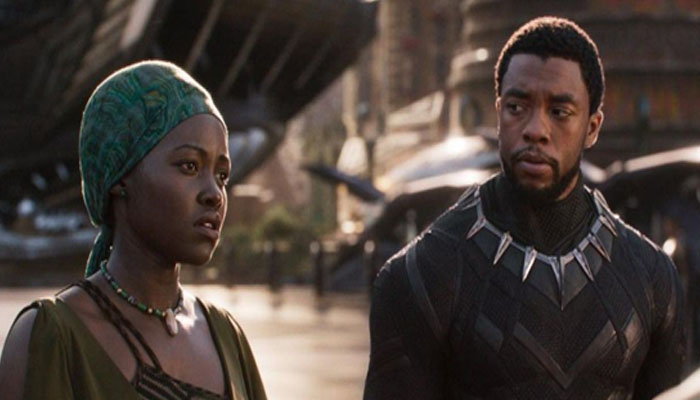
Unlike most stories, the women in Black Panther lead the way, and don’t wait for the men to come and save them and the world. T’Challa, after learning of his father’s assassination at the United Nations building, goes on a rescue mission outside Wakanda to Nigeria, to “save” his ex-girlfriend, Nakia. T’Challa winds up fighting alongside Nakia, to free a group of kidnapped refugees. Nakia is not pleased that T’Challa came to rescue her. She is an intelligent spy, and is upset that T’Challa has “ruined her mission.” Her reaction to T’Challa sends a strong message that she doesn’t need him, and that she will be assisting him from this point on.

Another defining moment early on is when Okoye, the woman general of the Dora Milaje, the incredibly fierce all-female secret service team, defies T’Challa orders by joining in on the fight against the militants as well. When T’challa freezes at the sight of Nakia, she saves his life, and a refugee’s. Okoye plays an important role of protector to the king, and will have to make crucial choices between her loyalty and her sworn duty as general, that ultimately will determine if Wakanda will wage war with the world.
As the story progresses, Nakia feels guilty for leaving the refugees behind to fend for themselves, and begins to advise T’Challa to do more to help those outside of Wakanda. She takes on the role of becoming T’Challa’s mentor, a role usually reserved for an older male in the typical superhero story.
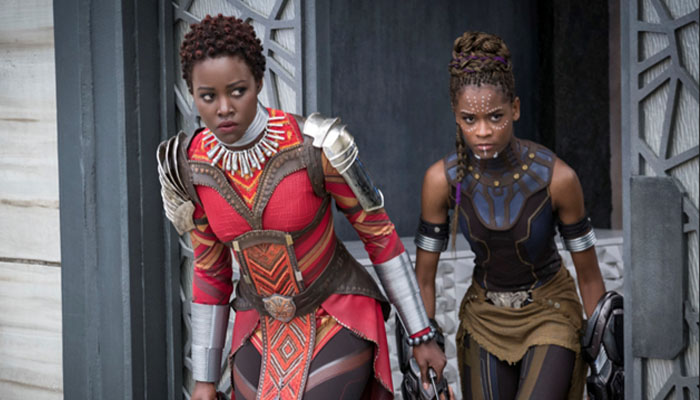
As the stakes grow higher as Killmonger gains power, the women along with Shuri, T’Challa’s talented teenage sister, lead the way in devising plans and providing the tools for T’Challa to succeed. It is clear that without their keen assistance, he would fail.
3. Stealing vs Rightful Ownership: The Museum Director & Killmonger
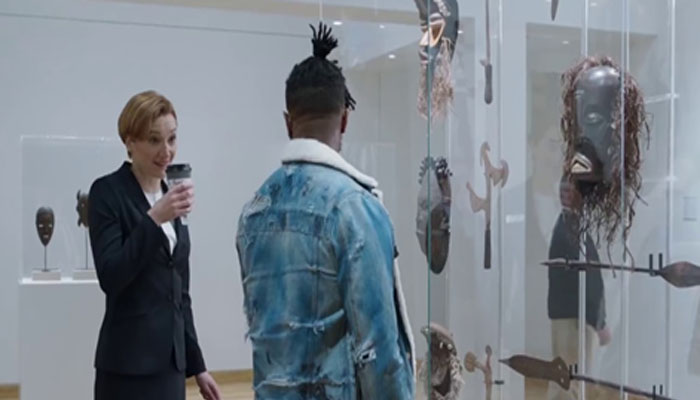
The contrast of Killmonger dressed in street clothes educating a pompous know-it-all British museum director about African artifacts, makes for an eye-opening moment. The director doesn’t have a clue as to who she is dealing with, as she ‘explains’ the history of each artifact. Killmonger is well aware of the artifacts’ origins. He is merely using her to setup his distraction and execute his plan. As she gets more uncomfortable, she ends her commentary with these “items are not for sale.”
Our supposed villain, Killmonger, a trained killer, accustomed to death by his surroundings in Oakland, and by his CIA training, has no intention of buying anything. He politely tells her that she shouldn’t worry, because he is going to “take them off of her hands.” The cunning Killmonger and his partners have long since set their plan in motion, by poisoning her coffee, as he tells her “you should be more careful of what you put in your cup.” She can only fall to the floor, realizing the crew’s plot and her impending demise.
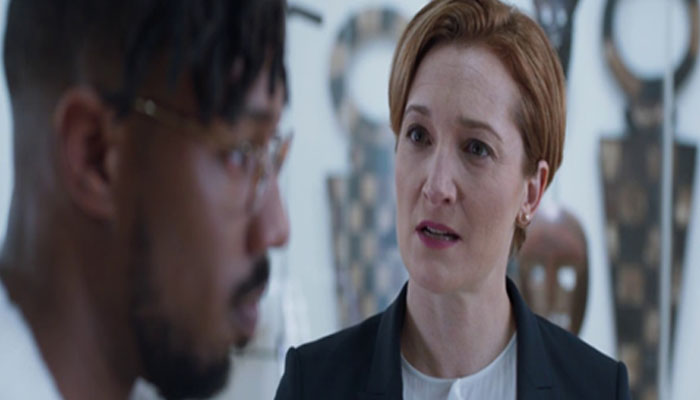
This scene is Killmonger’s first strike in the film, and symbolizes revenge for his ancestors. In addition, this is a critical segment, because we are forced to understand Killmonger’s position early on, asking the question who is really right and who is wrong, since the items were stolen by the British from the Africans in the first place. It also continues the resonating plight of N’Jobu, now resurected through his son, Killmonger.
4. Klaue, a South African Smuggler, Becomes an Enabler of Killmonger & N’Jobu

Klaue, a South African man of European ancestry, with an obvious criminal demeanor, is a substantial turn from the pompous British museum director. Klaue represents a modern day soldier thief, who steals from nations for a profit, similar to the British soldiers who stole the African artifacts centuries ago.
Klaue is portrayed as the villain initially, when the Wakandans discover he had stolen the vibranium, and that he’s setup a potential sale to an American, CIA Agent Ross. T’Challa and the others declare Klaue as their number one enemy, and immediately seek out to capture him. Little do they know that Klaue is merely a shield for Killmonger, and that their mission is inherently flawed, due to T’Chaka’s secret decades earlier.
Klaue becomes an enabler of Killmonger’s and N’Jobu’s objective of providing power to those who are oppressed. Killmonger not only uses Klaue to steal the artifacts back, including the Wakandan precious vibranium, but he later uses Klaue’s dead body as a tool to turn T’Challa’s best friend, W’Kabi, against him.
5. From Foe to Friend: The Role Reversal of M’Baku
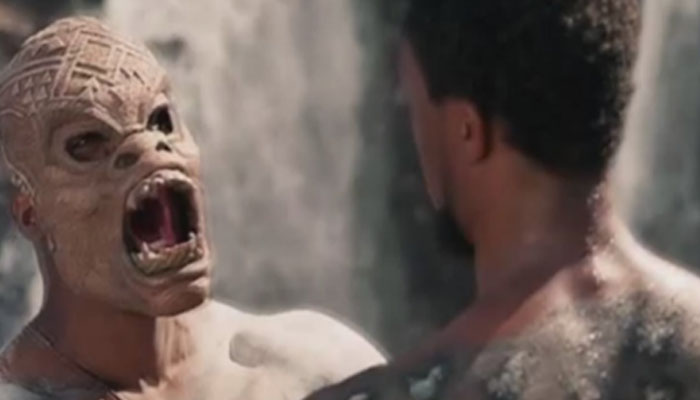
Even though T’Challa is assumed to take the throne after T’Chaka’s assassination, he must endure ritual combat against anyone who is eligible to challenge him for the throne. M’Baku, the leader of the isolated Jabari tribe, enters the challenge area and is immediately portrayed as a villainous monster. Zuri, who is now the Head Shaman (religious leader) of Wakanda, asks M’Baku, “What are you doing here?” M’Baku simply responds, “It’s challenge day.” M’Baku has a right to be there and to challenge T’Challa for the throne just as all the other tribes do, yet he is treated as an outsider. From the other tribes’ reactions, M’Baku and his Jabari tribe are in a sense the outside group of cousins that the rest of the family doesn’t want at the cookout.
What’s more is although it is only mentioned once in the film, M’Baku proudly proclaims “Glory to Hanuman,” right to T’Challa’s face before the challenge. It is clear that the Jabari recognize a different god, a gorilla. The rest of the Wakandan tribes, recognize Bast, a panther, as their god.
As a powerful warrior, M’Baku has the upperhand throughout most of the combat, up until the very end, when T’Challa gains strength from his mother Ramona reminding him who he is. T’Challa tells M’Baku he has fought honorably, and that he should yield, so that he can be around to lead his tribe. M’Baku agrees and yields, clearing the way for TChalla to be crowned king and the Black Panther.
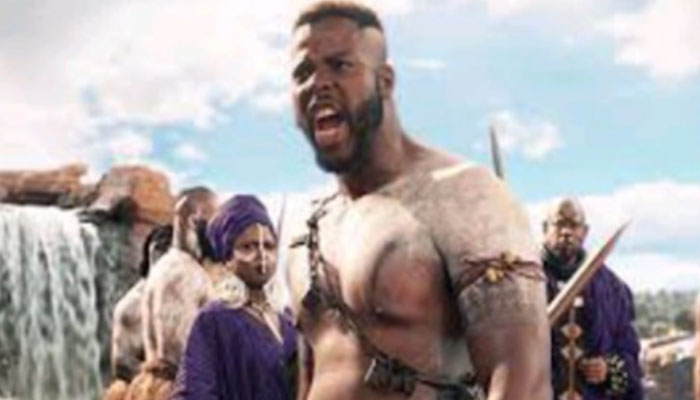
M’Baku, who the Wakandans think is another enemy, respects the Wakandan traditions even more so than the other tribes. He leaves with his warriors back to their isolated mountain region, and isn’t seen again until later when Nakia bravely leads a group to approach him for help.
Although M’Baku is considered an outsider, his respect for honor and tradition saves T’Challa’s life later on after Killmonger throws him over the waterfall, putting him in a coma. When Ramona and Shuri try to plead with M’Baku for help against Killmonger, he scolds them for their lack of respect towards him and the challenge itself. He doesn’t show any sympathy for the family, but rather wants to know if T’Challa lost the fight against fairly.
Unlike Ramona and Shuri, Nakia, the calculating spy, senses M’Baku’s respect for tradition, and she instinctively approaches him as “Great Gorilla M’Baku.” She offers him the heart-shaped herb she took earlier, however M’Baku, won’t accept it. M’Baku, knows the herb would give him the power of the Black Panther, yet instead, takes Nakia and the group to the unconscious T’Challa, so that they can use the herb to save him.
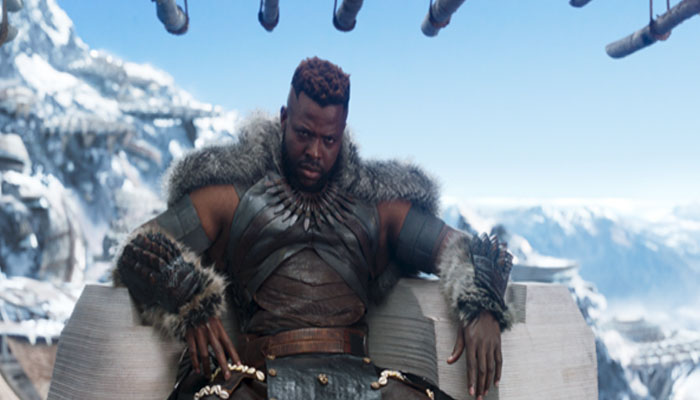
The Jabari have been keeping T’Challa alive in their healing grounds, without any heart-shaped herbs. They use some other healing power, although the specifics aren’t clear. One thing is for sure from the story, the vibranium affected all plant life on the African continent, so perhaps that part of the story will be revealed in the sequel.
M’Baku warns the group that if they move T’Challa, he will die instantly. After Ramona revives him with the herb, the honorable M’Baku won’t allow TChalla to thank him, saying he gave a “life for a life,” (referring to when T’Challa urged him to yield during the challenge, rather that killing M’Baku.) On the other hand, when T’Challa asks M’Baku for his army’s assistance against Killmonger, M’Baku blasts him, stating T’Challa is the first king to come there in centuries.
Heroically, M’Baku has a change of heart, and steps in later at the right moment to help the Dora fight the Border tribe, which ultimately turns the tide in T’Challa’s favor. The leader of the isolated tribe, is now a key component of T’Challa’s quest of restoring order to Wakanda.
6. Instead of the Father, the Spy Mentors the New King
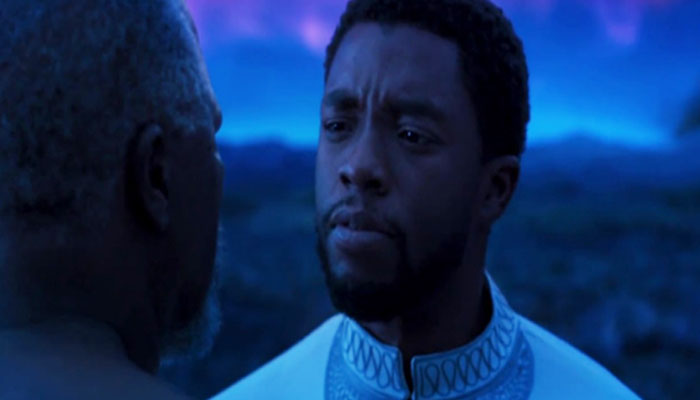
After T’Challa is crowned, he visits his father T’Chaka in the Wakandan ancestral plane. T’Challa asks him for advice on being a king, and how to protect Wakanda, but T’Chaka doesn’t give a clear answer, as if he is hiding something.
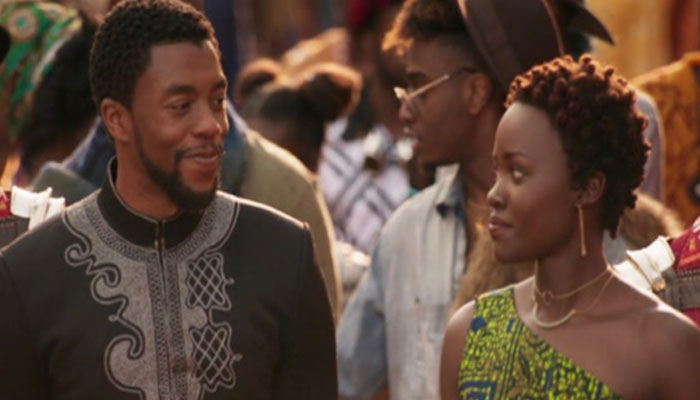
Then T’Challa and Nakia take a stroll through the capital of Wakanda, where we see a prosperous scene of commerce amongst the Wakandan people. Nakia, thinking of those on the outside of Wakanda, encourages T’Challa as the new king to do more than the other kings have in the past – foreign aid, refugee programs, etc. T’Challa contemplates her ideals, but doesn’t take action, (thus initially the refusing the call – a key part of the hero’s journey). Instead, he suggests that she become his queen. Nakia, however, is not eager to be queen, but rather wants to continue her mission of helping others. She continues to mentor when T’Challa doubts his ability to be king, telling him you are a king of you are making. She gives him more advice and counsel than T’Chaka does, and in the process, helps to persuade him to change his policies from that of the other kings before him.
Nakia’s role is unique in that she rather than showcasing her as simply the love interest of T’Challa, as most hero movies would, she is shown to be his mentor and in many situations the rescuer as well.
7. From Friend to Foe: The Role Reversal of W’Kabi

T’Challa meets with his best friend W’Kabi, the leader of the Border Tribe, and shares Nakia’s ideas with him. W’Kabi doesn’t approve of bringing any outsiders into Wakanda, saying if you bring them in, “all of their problems come with them.” W’Kabi’s statement will come back to prove true, in an unexpected way, after T’Challa can’t keep a promise he makes to W’Kabi of delivering Klaue to justice for murdering W’Kabi’s parents.
Okoye, who is not only the general, but the girlfriend of W’Kabi, signals to him and and T’Challa that Klaue has stolen vibranium, and plans to sell it in Korea. T’Challa must now choose to act, a pivotal part of the Hero’s Journey. In the process, W’Kabi makes T’Challa promise to either kill Klaue or deliver him to justice back in Wakanda. T’Challa concurs, not realizing his mission is already tragically flawed from his father’s and Zuri’s secrets long ago. T’Challa won’t be able to keep the promise to W’Kabi no matter how hard he tries to deliver Klaue.
Killmonger, the delivers Klaues dead body directly to W’Kabi inside of the Wakandan border. This morbid gift from Killmonger to W’Kabi sets off a role reversal of W’Kabi from best friend to enemy.
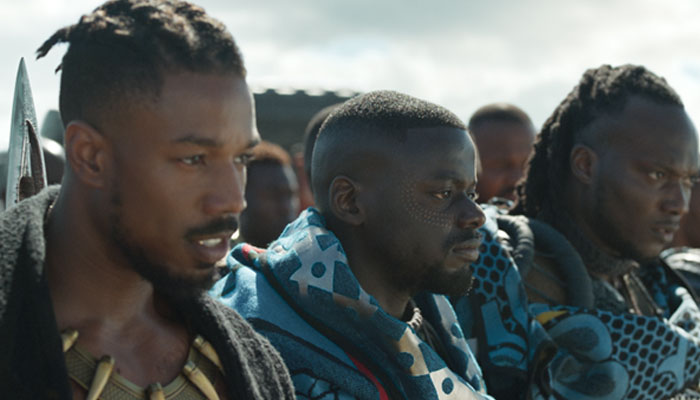
Kilmonger can’t carry out his mission of gearing up the Wakandan War Dogs with weapons without W’Kabi. Ironically, as the leader of the Border Tribe, W’kabi should above all others protect the Wakandan border, but due to his grief, he has let an outsider in – Killmonger. Now that outsider has taken over the throne, and is preparing to wage world with the world. W’Kabi, blinded by revenge for his parents death, violates the Wakandan law of maintaining its secrecy at the moment Killmonger delivers Klaue’s dead body. W’Kabi now considers T’Challa a foe, and Killmonger a partner in revenge. Furthermore, W’Kabi is also the person who hands Ramona, the Queen Mother the vital evidence of lineage with the family heirloom ring, proving Killmonger is the son of N’Jobu. In the end, it is Okoye, his girlfriend and the Dora Milije general who forces him to halt his rebellion.
8. Zuri & the Gateway Between T’Challa, Killmonger, & Their Fathers
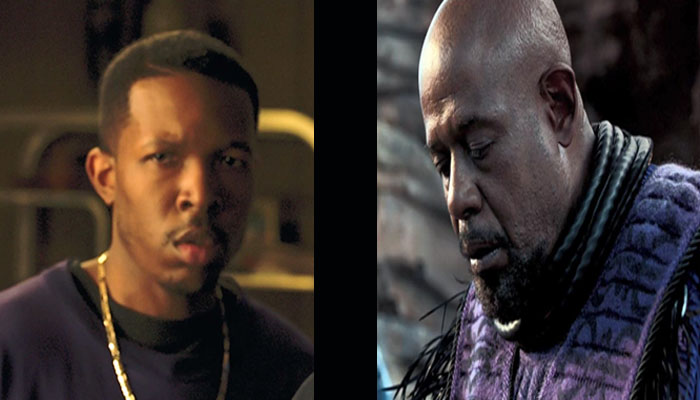
Zuri, the Shaman of Wakanda, serves as the supernatural guide to both T’Challa and to Killmonger, leading them to their fathers’ in the Wakandan ancestral plane. He has the important responsibility upholding Wakandan traditions in offering the path to the throne. Furthermore, it is Zuri who strips away and provides the power of the Black Panther through their God, Bast, and the precious heart-shaped herbs. However, as powerful as he is, Zuri is tormented by the secret of the abandoned child, Killmonger, and by the fact that T’Challa killed N’Jobu to save his life. When Zuri asks T’Challa upon his return from Korea, “so your mission did not go as planned?” he already knew T’Challa failed through no fault of his own.
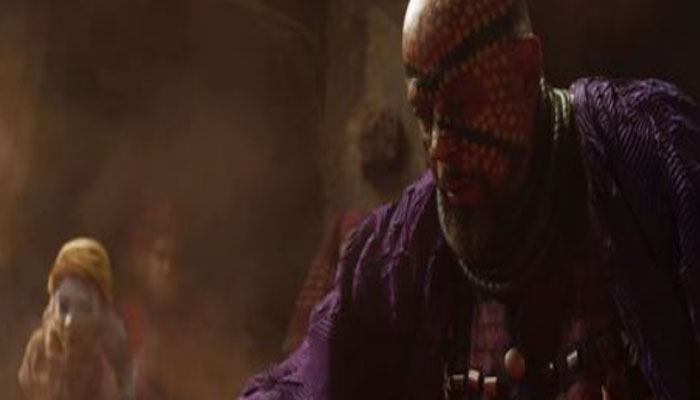
Zuri is in the awkward position of wanting to honor T’Chaka’a wishes of secrecy, yet he believes in both Killmonger’s and now T’Challa’s goal of ending the cycle of leaving people behind. He has been carrying the guilt of N’Jobu’s death, and that of leaving his young son, Killmonger, behind, much more the T’Chaka ever did. When T’Challa confronts him, Zuri feels he can no longer support T’Chaka’s secret, and he finally tells T’Challa the truth. By doing so, Zuri has enabled T’Challa a path to restore order, by removing the curse of T’Chaka’s lies hanging over him.
9. The Education of CIA Agent Ross by Princess Shuri
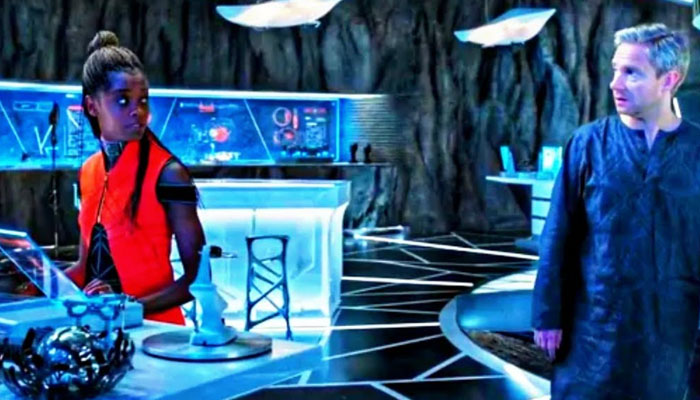
Shuri, the teenage sister of T’Challa, is a vital team member to the entire mission. Throughout the movie, Shuri provides expertise technology devices for T’Challa, such as designing his new armor with kinetic energy, and designing and driving the car for him the team pursues Klaue.
When the American Agent Ross wakes up from his spinal surgery performed by Shuri, he’s utterly amazed at the technological advancements all around him. He is even more so amazed at Shuri’s personal knowledge and expertise, so much in fact, that he now views the Wakandans differently than in the past. He now realizes that the vibranium is more than a weapon, and they can assist the rest of the world a great deal.
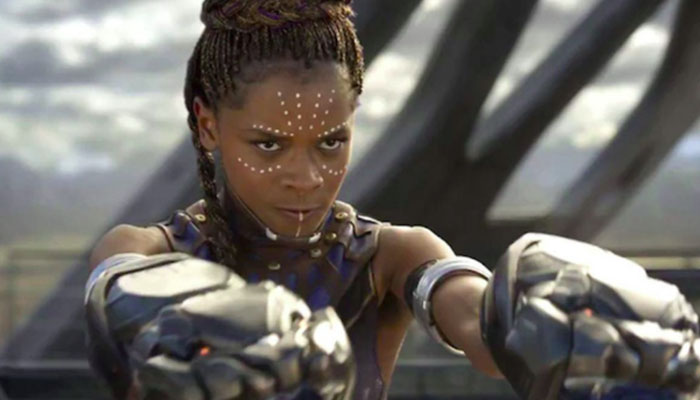
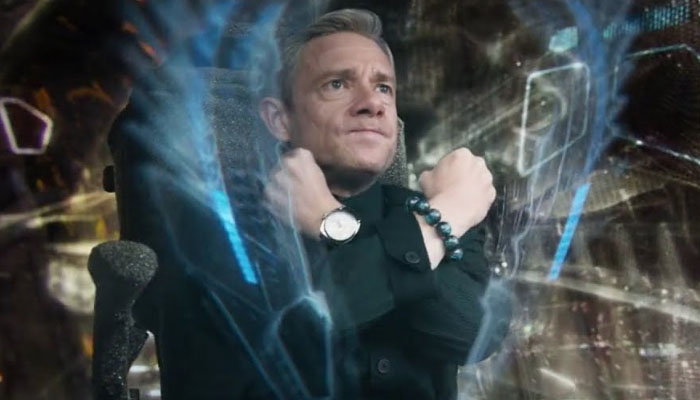
Most importantly, Shuri’s takes on a dual key role: fighting in hand-to-hand combat alongside Nakia, with devices she designed, while at the same time, coaching Ross as a fighter pilot during the dogfight against the Wakandans.
Shuri, knowing his piloting skills would be of assistance to T’Challa, instinctively creates the cockpit hologram in “American Style” for Ross to use. She then encourages Ross to remember his talent as a fighter pilot, and guides him each step of the way, as shoots down the Wakandan planes one by one. The entire role of a young African female designing tools for the hero’s cause, and that of leading an older white male in combat is historic in itself.
10. The World Will Change from Assuming to Listening
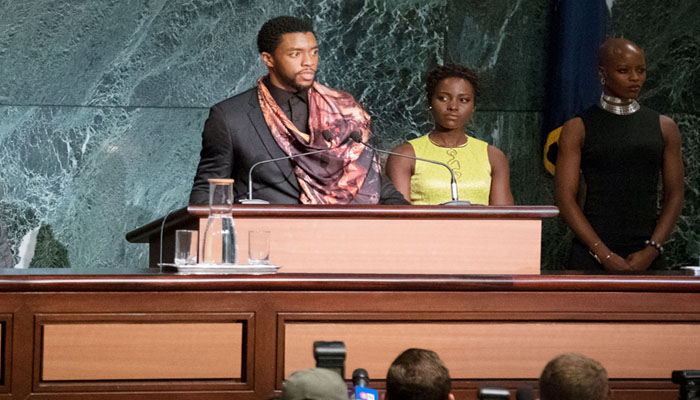
In the beginning scenes of the movie, T’Challa watches a BBC News broadcast of his father’s assasination. The news anchor states, “Though it remains one of the poorest countries in the world… Wakanda does not engage in international trade or accept aid.” This is, of course, is far from the truth, but since the Wakandans have lived in secrecy due to their fear of losing control of the vibranium, the rest of the world views them as weak. When T’Challa stands before the UN to present the truth, he is met with the same assumptions – “What can a nation of farmers offer the rest of the world?” T’Challa simply smiles to the French ambassador in response, as he knows the world will be stunned with his announcement, and Wakanda’s advanced technology.
The inspirational scene represents a change in how the world will now view African nations as not simply recipients of foreign aid, but as major contributors to the world at large, both scientifically and economically. In addition, T’Challa makes it clear he is a real leader, by advising the nations, “We must find a way to look after one another, as if we are one single tribe.”
Black Panther’s True Impact: The Next Generation

Black Panther certainly caught the attention of the real world. Never before has a movie with a predominately black cast made such an impact on not only the business of filmmaking, but how the world views films representing African culture. The movie challenged the characters tough themes of protection versus abandonment, while embracing traditional customs, and showed the world a new advance view of Africa.
Yet, for all its revenue and accolades, the full impact of the movie may not be seen for generations to come. Many children and teenagers of all backgrounds filled the seats across the world, watching for the first time a black superhero, and a black supporting cast in a major film production. Out of those movie goers, someone, perhaps even several, may have been encouraged to begin writing their own story, and in turn, their own film. When a movie inspires new minds to create, it has won the greatest award.
Analysist requested by a third party company.
